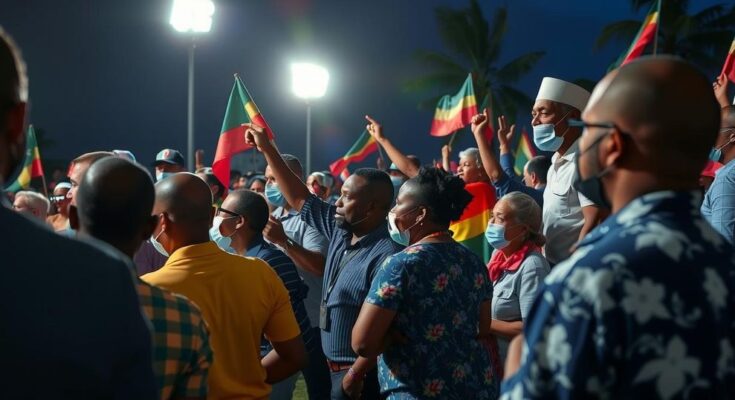Mauritius’ Prime Minister Pravind Jugnauth acknowledges a looming electoral defeat for his ruling coalition following parliamentary elections. The opposition, led by former Prime Minister Navin Ramgoolam, appears poised to win amid ongoing corruption allegations against Jugnauth’s administration. Final results are expected soon, potentially marking a significant political transition in the country.
On Monday, Prime Minister Pravind Jugnauth of Mauritius admitted that his ruling coalition is heading for a significant electoral defeat after the parliamentary elections held on Sunday. Despite the ongoing vote count, the Prime Minister recognized the unpopularity of his Militant Socialist Movement. Jugnauth, who has led the nation since 2017 and was seeking re-election, faced considerable backlash following allegations of corruption linked to leaked recordings involving politicians and businessmen. The opposition Alliance for Change coalition, headed by former Prime Minister Navin Ramgoolam, seems to be in a favorable position to win the elections, although they have yet to release an official statement. Jugnauth stated, “The population has decided to choose another team. I wish good luck to the country.” He remarked on the need for change as final results are awaited by the end of the day. This election, marking the twelfth since Mauritius achieved independence from British rule in 1968, involved over 1 million registered voters casting their ballots for 62 parliamentary seats. The winning party or coalition is tasked with selecting the Prime Minister, highlighting the significant political transition that may soon come to the island nation. Mauritius, situated approximately 2,000 kilometers off the east coast of Africa, has historically maintained a strong economy centered around finance, tourism, and agriculture. However, it encountered setbacks, particularly following the COVID-19 pandemic, which resulted in the country losing its status as a high-income economy in 2020.
Mauritius, a small island nation in the Indian Ocean, has been characterized by its stable democracy and robust economic performance. Since gaining independence in 1968, the country has held regular elections, demonstrating a commitment to democratic governance. However, recent political challenges, including allegations of corruption against key government figures, have raised concerns about the current administration’s integrity and popularity. Following a decline in tourism due to the pandemic, the nation faces economic uncertainties, further complicating its political landscape as citizens head to the polls.
In conclusion, the recent parliamentary elections in Mauritius signal a potential shift in the political landscape, with Prime Minister Jugnauth’s coalition bracing for what he termed a ‘huge defeat.’ The emergence of the Alliance for Change coalition as a formidable contender raises questions about future governance amid allegations of corruption that have plagued Jugnauth’s government. As results are finalized, it remains to be seen how this election will reshape the political and economic trajectory of this vibrant island nation.
Original Source: apnews.com




